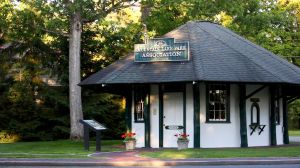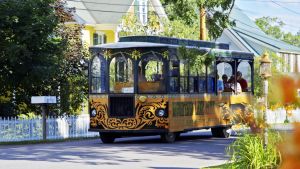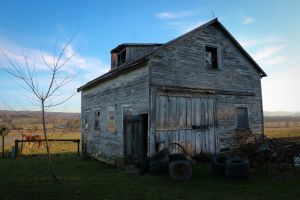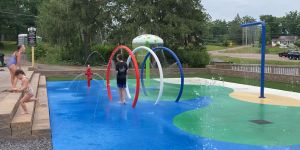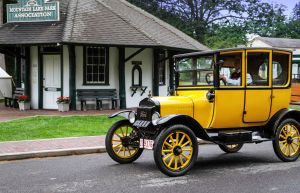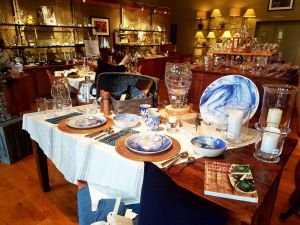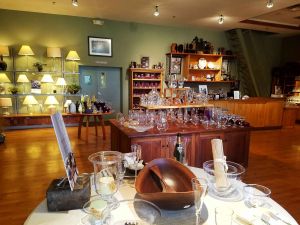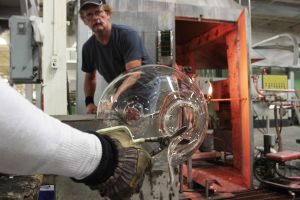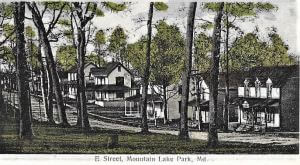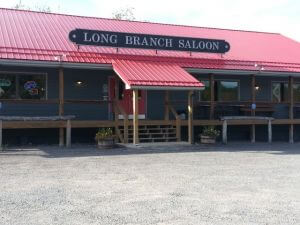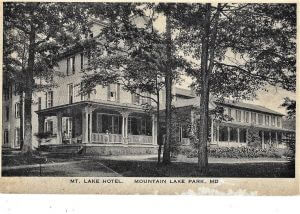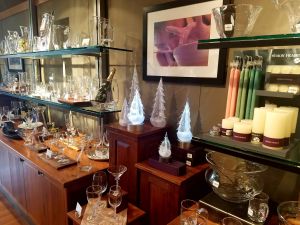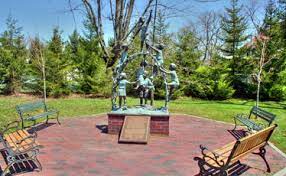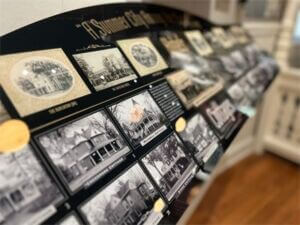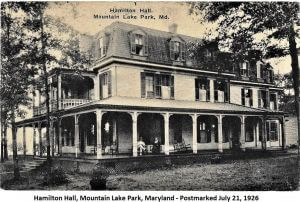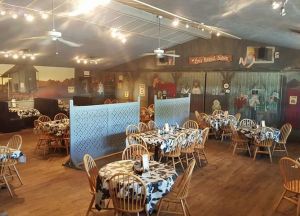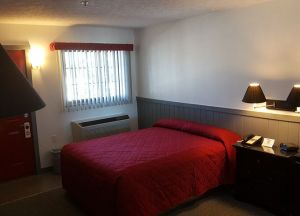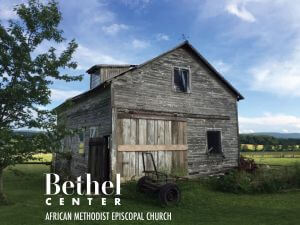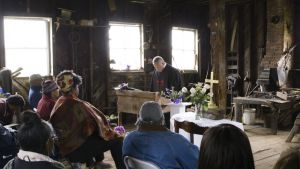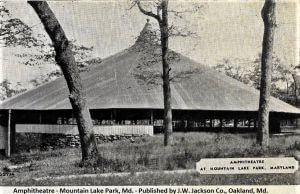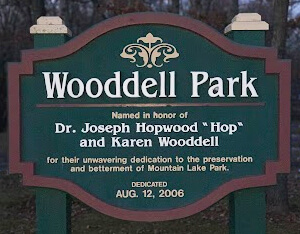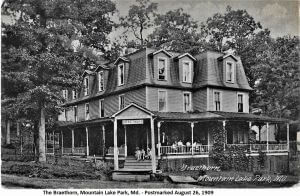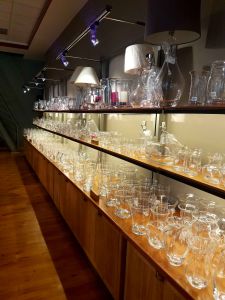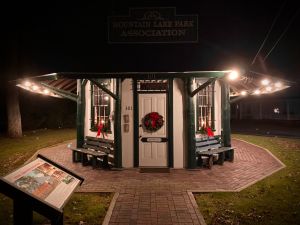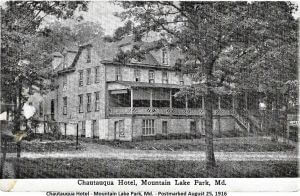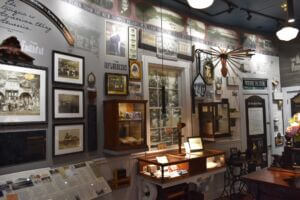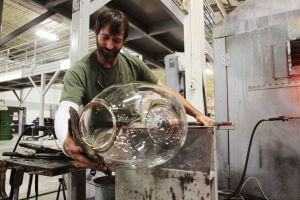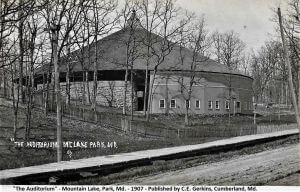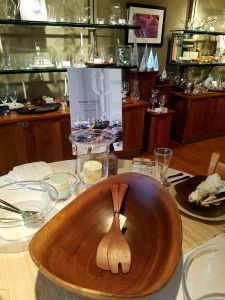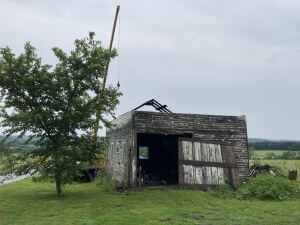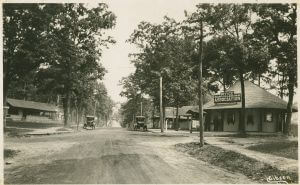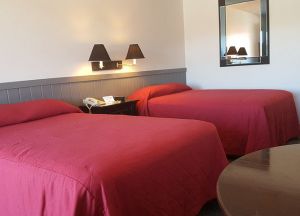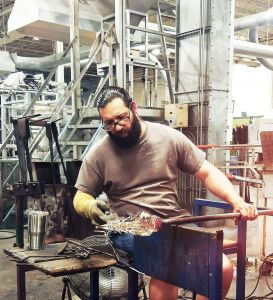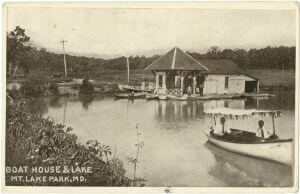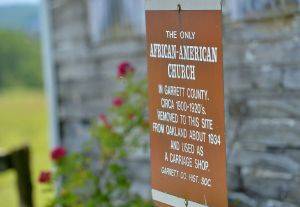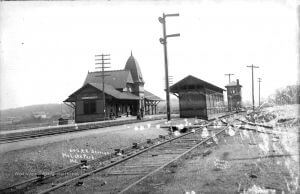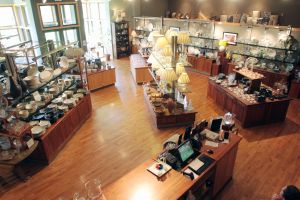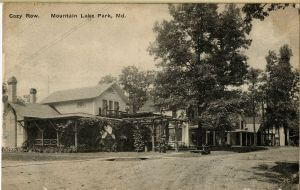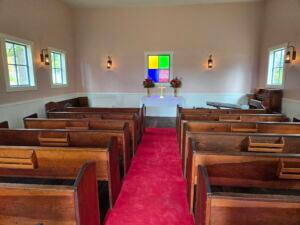Activities, Attractions, Lodging, Dining & Shopping
The town of Mountain Lake Park offers a plethora of historic sites along with unique attractions and activities.
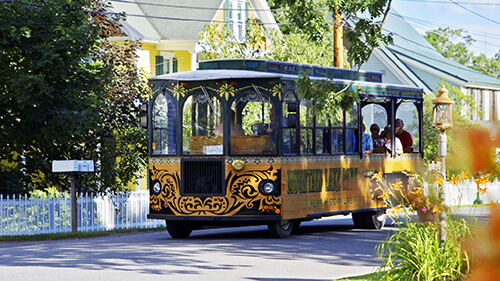 Once a booming summer resort town, many of the historic buildings from yesteryear remain today. The Mountain Lake Park Historic District, a group of 145 buildings lying within the town of Mountain Lake Park, was listed on the National Register of Historic Places in 1983. 61 original structures remain in Mountain Lake Park today. The historic round open-air Bashford Amphitheater, built in 1900, included a similarly designed Ticket Office that remains to this day and now houses a Museum where you can view a collection of Mountain Lake Park memorabilia and photos that date back to 1881. Walking and driving tour maps of Mountain Lake Park's historic sites are also available at the Museum, located at 301 G. St. Mountain Lake Park Trolley tours are held annually at the Victorian Chautauqua, over Autumn Glory Weekend and other special dates may be scheduled throughout the year.
Once a booming summer resort town, many of the historic buildings from yesteryear remain today. The Mountain Lake Park Historic District, a group of 145 buildings lying within the town of Mountain Lake Park, was listed on the National Register of Historic Places in 1983. 61 original structures remain in Mountain Lake Park today. The historic round open-air Bashford Amphitheater, built in 1900, included a similarly designed Ticket Office that remains to this day and now houses a Museum where you can view a collection of Mountain Lake Park memorabilia and photos that date back to 1881. Walking and driving tour maps of Mountain Lake Park's historic sites are also available at the Museum, located at 301 G. St. Mountain Lake Park Trolley tours are held annually at the Victorian Chautauqua, over Autumn Glory Weekend and other special dates may be scheduled throughout the year.
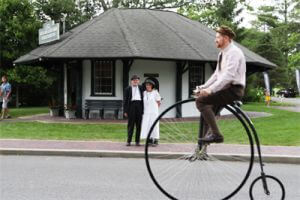 To celebrate Mountain Lake Park's founding, the town hosts their Victorian Chautauqua event every year on the weekend following the 4th of July. The free event includes performances, lectures, live music, and activities that bring to life a bygone era that began as a planned community along the B&O Railroad.
To celebrate Mountain Lake Park's founding, the town hosts their Victorian Chautauqua event every year on the weekend following the 4th of July. The free event includes performances, lectures, live music, and activities that bring to life a bygone era that began as a planned community along the B&O Railroad.
Woodell Park offers a playground and basketball court and Leo Martin Memorial Park features the Mountain Lake Park Splash pad, a popular attraction for children and adults alike! The splash pad is open daily from 11 am - 7:30 pm during the summer, weather permitting.
Riverside Suites and Grille, formerly Long Branch Saloon, offers dine in or carryout. Riverside Grille features American-style dishes with a few twists!
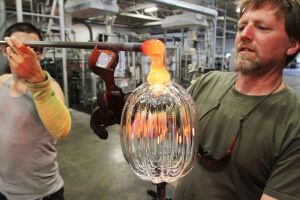 Mountain Lake Park is also home to Simon Pearce Factory Outlet & Glassblowing where you can shop their store for glasswork, home decor, candles and more or view the glassblowers create daily from 10 am - 2 pm.
Mountain Lake Park is also home to Simon Pearce Factory Outlet & Glassblowing where you can shop their store for glasswork, home decor, candles and more or view the glassblowers create daily from 10 am - 2 pm.
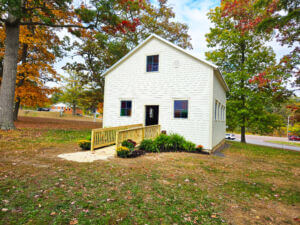 In an effort to continue to keep Garrett County's history alive, the Bethel African Methodist Episcopal (A.M.E.) Church underwent a restoration and relocation to Mountain Lake Park. Existing from the late Nineteenth Century through the early Twentieth Century, the Church was the only African American congregation in Garrett County, originally located on the corner of Fifth and High Streets in Oakland. As the economy declined and racial bias reared an unwelcoming climate for African Americans, a dwindling congregation finally ended in the 1920s. The Church served a few other purposes before being razed and sold to Simon Swartzentruber who moved the structure to his farm in Pleasant Valley. He repurposed the building as a blacksmith and harness shop for several decades. The Bethel A.M.E Church survived its second iteration but has fallen into a state of disrepair. The restoration and relocation aims to honor the forgotten Black citizens who helped develop Garrett County over a century ago. Renamed Bethel Center, the structure highlights the stories and contributions of its people and will feature exhibitions, programs, and events.
In an effort to continue to keep Garrett County's history alive, the Bethel African Methodist Episcopal (A.M.E.) Church underwent a restoration and relocation to Mountain Lake Park. Existing from the late Nineteenth Century through the early Twentieth Century, the Church was the only African American congregation in Garrett County, originally located on the corner of Fifth and High Streets in Oakland. As the economy declined and racial bias reared an unwelcoming climate for African Americans, a dwindling congregation finally ended in the 1920s. The Church served a few other purposes before being razed and sold to Simon Swartzentruber who moved the structure to his farm in Pleasant Valley. He repurposed the building as a blacksmith and harness shop for several decades. The Bethel A.M.E Church survived its second iteration but has fallen into a state of disrepair. The restoration and relocation aims to honor the forgotten Black citizens who helped develop Garrett County over a century ago. Renamed Bethel Center, the structure highlights the stories and contributions of its people and will feature exhibitions, programs, and events.
History
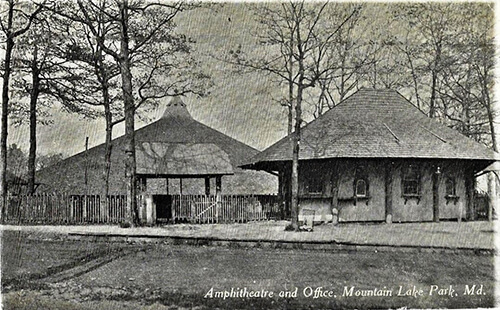 The second Chautauqua in the United States was founded in Mountain Lake Park, along the Baltimore & Ohio Railroad in 1881. A group of Methodist ministers and businessmen decided to create the Mountain Chautauqua in Maryland, modeled after the 1875 Chautauqua in New York state. The group purchased 800 acres of farmland in Garrett County, founded an association called Mountain Lake Park, and organized the first Mountain Chautauqua in the summer of 1882. The program presented a wide range of educational, spiritual, social, and recreational activities throughout the summer months. A small group of ministers and businessmen began the association with nothing more than a dream. Not even a lake was on the 800 acres they purchased for the proposed resort. That was quickly resolved by constructing a dam to create the lake for recreation through the summer months and for ice harvests in the cold season. The Alleghany Mountain location gained much praise and attracted notable guest lecturers including, Mark Twain, William Jennings Bryan, and President Taft. In its heyday, Mountain Lake Park boasted 254 structures including the famed Bashford Amphitheater, one of the finest and best equipped auditoriums in the country at the time, that seated 5,000 people. The Bashford Amphitheater was razed in the 1940s due to lack of funding to repair the roof.
The second Chautauqua in the United States was founded in Mountain Lake Park, along the Baltimore & Ohio Railroad in 1881. A group of Methodist ministers and businessmen decided to create the Mountain Chautauqua in Maryland, modeled after the 1875 Chautauqua in New York state. The group purchased 800 acres of farmland in Garrett County, founded an association called Mountain Lake Park, and organized the first Mountain Chautauqua in the summer of 1882. The program presented a wide range of educational, spiritual, social, and recreational activities throughout the summer months. A small group of ministers and businessmen began the association with nothing more than a dream. Not even a lake was on the 800 acres they purchased for the proposed resort. That was quickly resolved by constructing a dam to create the lake for recreation through the summer months and for ice harvests in the cold season. The Alleghany Mountain location gained much praise and attracted notable guest lecturers including, Mark Twain, William Jennings Bryan, and President Taft. In its heyday, Mountain Lake Park boasted 254 structures including the famed Bashford Amphitheater, one of the finest and best equipped auditoriums in the country at the time, that seated 5,000 people. The Bashford Amphitheater was razed in the 1940s due to lack of funding to repair the roof.
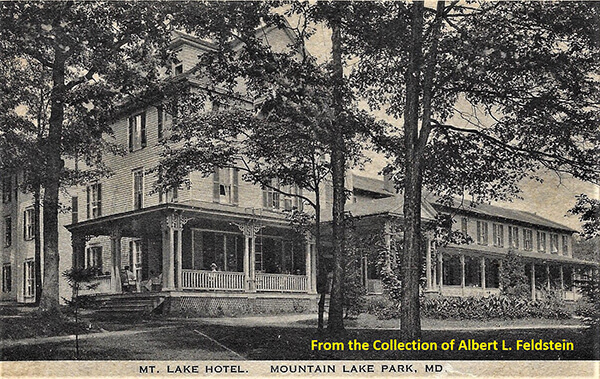 In May 1882, the erection of the famous Mountain Lake Hotel began. The hotel was extremely popular and from 1890 to 1900 the Mountain Lake Hotel doubled its capacity and the nearby Hotel Dennett and Hotel Chautauqua were also enlarged. The Mountain Lake Park association office was built in 1883 and enlarged in 1894. The Assembly House was built in the early part of 1885. In 1894, the lake was greatly enlarged so as to cover about 35 more acres of land. An ice house with a capacity of 2500 tons was erected on the East side and a boat house on the West side. In 1896, a fine livery of boats was placed on the lake, which became one of the attractions of the Park.
In May 1882, the erection of the famous Mountain Lake Hotel began. The hotel was extremely popular and from 1890 to 1900 the Mountain Lake Hotel doubled its capacity and the nearby Hotel Dennett and Hotel Chautauqua were also enlarged. The Mountain Lake Park association office was built in 1883 and enlarged in 1894. The Assembly House was built in the early part of 1885. In 1894, the lake was greatly enlarged so as to cover about 35 more acres of land. An ice house with a capacity of 2500 tons was erected on the East side and a boat house on the West side. In 1896, a fine livery of boats was placed on the lake, which became one of the attractions of the Park.
Along with the MLP Museum (formerly the Ticket Office), other significant buildings still standing are The Assembly Hall, The Thompson Rest Home for Deaconesses, Town Hall, clay Tennis Courts, the original Methodist Church, and over 50 summer cottages dating back to 1882.

